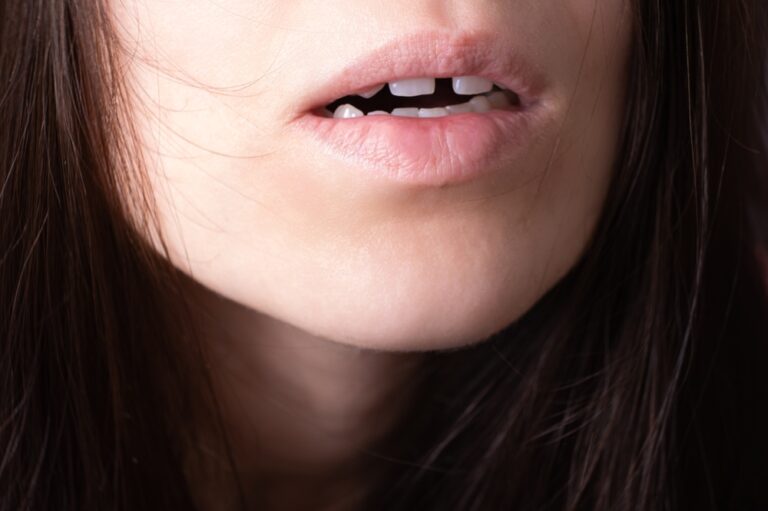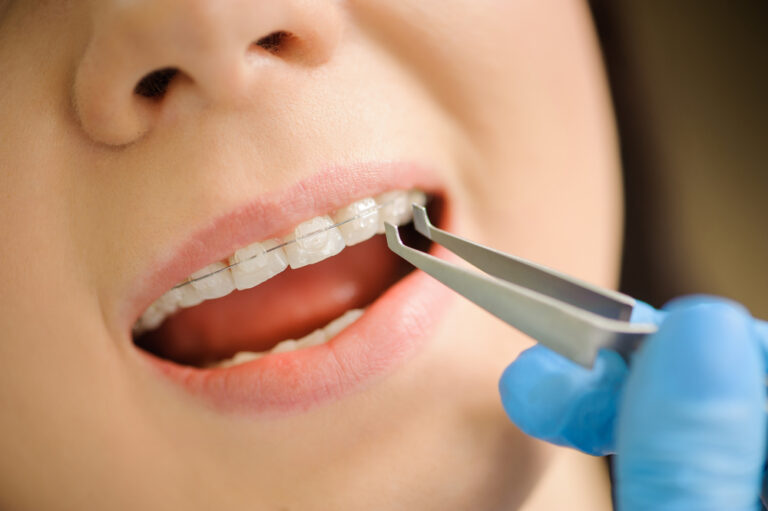Understanding sensitive teeth
Sensitive teeth, also known as dentin hypersensitivity, is an extremely common problem that affects millions of people. Studies show that up to 30–40% of adults suffer from sensitive teeth. It can occur at any age, though it is more prevalent among middle-aged adults.
Sensitive teeth is characterized by sharp, sudden pain or discomfort in the teeth when exposed to hot, cold, sweet, acidic or sticky foods and drinks. Some people may feel pain from even lukewarm foods. The degree of pain can range from mild to severe enough to affect a person’s quality of life.
This tooth sensitivity occurs when the dentin layer underneath the hard enamel tooth covering becomes exposed, either due to enamel loss, gum recession, or both. Dentin contains thousands of microscopic tubules leading directly to the tooth’s inner nerves. When the protective enamel layer wears away, the dentin tubules become exposed, resulting in pain and discomfort from hot/cold temperatures, air pressure changes, or acidic/sticky foods and drinks making contact with the exposed area.
What causes sensitive teeth?
Sensitive teeth can occur for a variety of reasons. Here are some of the main causes:
1. Gum recession
Gum recession is a key cause of root sensitivity. It occurs when the gums pull away from the teeth, exposing the tooth roots and dentin. Gum recession is typically caused by:
- Aggressive brushing habits – excessive horizontal scrubbing motion causes gradual erosion of gum tissue.
- Periodontal disease due to plaque buildup. Chronic inflammation damages the gum tissue and ligaments.
- Aging – gums naturally recede and pull away from the teeth over time.
- Genetic predisposition – some people are more prone genetically to receding gums and sensitive teeth.
As more of the tooth root becomes uncovered by the gums receding, the exposed dentin leads to sensitivity. The older a person is, the more gum recession occurs from brushing over a lifetime.
2. Loss of enamel from erosion
Acidic foods and drinks erode and dissolve away the enamel over time. Frequent consumption of foods and drinks high in acidity such as citrus fruits, juices, wine, carbonated soft drinks, vinegar, pickles, sour candy and yogurt can thin and damage the enamel through repeated acid attacks.
Even stomach acids from gastric reflux or recurrent vomiting episodes can erode teeth. As the protective enamel layer wears away, the sensitive underlying dentin becomes exposed.
3. Bruxism – teeth grinding
Chronic teeth grinding (bruxism) wears down the enamel and exposes sensitive dentin. This often occurs during sleep due to high stress levels. The constant grinding motion slowly erodes the enamel layer away over time.
4. Age-related enamel wear
As we age, the enamel naturally wears thin and cracks more easily. Older teeth have less protective covering and are more likely to develop sensitivity.
5. Cracked or chipped teeth
Cracks or chips in the teeth allow hot, cold or acidic foods and liquids to penetrate deep inside the tooth and irritate the inner pulp tissue. Cracks permit rapid heat/cold transfer through the enamel and dentin layers.
6. Recent dental procedures
Certain dental treatments like fillings, crowns, implants and professional teeth cleanings can cause temporary sensitivity as the tooth settles and adjusts to the treatment. However, sensitivity lasting over 4-6 weeks may indicate an improperly fitted crown or occlusal imbalance.
7. Tooth whitening treatments
Tooth whitening treatments utilize peroxide compounds to lighten teeth color. Peroxide can temporarily damage the enamel layer and expose microscopic openings in it, resulting in transient sensitivity for several days up to a couple weeks after whitening.
When does sensitive tooth sensitivity go away?

The prognosis for sensitive teeth resolving depends on the original cause. For temporary sensitivity from dental procedures like fillings and crowns, the tooth typically settles down within 4-8 weeks as it recovers and adjusts to the work done.
Using desensitizing toothpaste and being patient for 1-2 months is often effective for minor sensitivity following routine dental treatments. However, if the sensitivity persists and continues getting worse months later, it likely indicates an issue needing attention from your dentist.
Recession-related sensitivity
Root sensitivity due to gum recession has a poorer prognosis for complete resolution. The exposed dentin tubules need to be protected and sealed off to mask discomfort. As long as gum recession is present, the sensitivity may periodically reoccur or fluctuate in severity. Diligent oral hygiene is required to prevent worsening recession over time.
Treatments like topical fluoride, sensitivity toothpaste, sealants and fillings can reduce discomfort but may not eliminate it fully if recession still exists. Stopping damaging habits like overzealous brushing is key to prevent the recession from progressing further.
Sensitivity from dental work
For lingering sensitivity after dental procedures, getting adjustments and correcting issues can provide relief. Possible solutions include smoothing rough edges or refitting crowns to balance the bite properly. If pressure on a tooth’s pulp tissue from a deep filling is causing continual irritation, a root canal may be needed for complete relief.
Chipped or cracked tooth sensitivity
The sensitivity from cracks and chips will not resolve until the tooth structure is repaired. Leaving exposed enamel and dentin permits constant irritation of the pulp tissue inside the tooth. Applying dental bonding, sealants or crowns is needed to cover cracks and chips for sensitivity to improve.
Tooth grinding habits
Nocturnal teeth grinding can continuously wear away enamel and expose sensitive dentin over time. Therefore, taking steps to manage bruxism and protect the teeth from its damaging forces is required for sensitivity relief. Options include stress reduction, a custom night guard and correcting bite issues.
How to cope with sensitive teeth discomfort
While addressing the root cause of sensitivity, the following methods can provide symptomatic relief:
- Desensitizing toothpaste – Regular use of toothpaste containing potassium nitrate or stannous fluoride can block pain signals from the nerves.
- Avoid trigger foods/drinks – Avoid exposing the sensitive areas to acidic, cold, hot, sweet or sticky foods/drinks which further irritate the uncovered dentin.
- Fluoride – Prescription strength fluoride toothpaste, rinses, gels or in-office fluoride varnish applications strengthen enamel and reduce sensitivity.
- Sealants and bonding – Sealants and bonding agents plug exposed dentinal tubules to insulate the inner tooth layers.
- Night guards – Wearing a custom night guard minimizes enamel damage from nocturnal teeth grinding. This prevents worsening sensitivity.
- Prompt dental treatment – Fixing decayed, cracked or damaged teeth prevents additional enamel loss and exposure of sensitive dentin.
- Gentle oral hygiene – Brush and floss carefully using soft bristles to avoid gum recession which would worsen root sensitivity.
When to see a dentist for sensitive teeth

Seeing a dentist promptly is recommended if sensitivity is severe, persistent and not improving with over-the-counter treatments. A dentist can:
- Pinpoint the exact location(s) and cause(s) of sensitivity
- Check for dental decay, leaking fillings, cracks or gum recession
- Assess if the nerve is involved using cold sensitivity testing
- Recommend prescription strength toothpastes or medicated rinses
- Apply fluoride varnish, sealants or bonding agents to protect exposed dentin
- Adjust or replace dental work causing irritation
- Provide restorations like crowns or fillings to cover problem areas
- Evaluate if gum grafting is needed to cover exposed roots
- Fit a custom night guard for protection against grinding forces
- Consider root canal therapy if the pulp nerve is compromised
Putting off visiting a dentist allows the problem to worsen over time. A dental exam is key for an accurate diagnosis and targeted treatment plan.
Long term treatments for sensitive teeth relief
While sensitive teeth cannot always be cured completely, there are several management strategies to minimize discomfort long term:
- Desensitizing toothpaste – Daily use of specialty toothpaste seals dentin tubules to reduce sensitivity. Popular ingredients include stannous fluoride, arginine, strontium chloride, and potassium nitrate.
- In-office sealant application – Dentist-applied sealants plug exposed dentin tubules and insulate the inner tooth layers. Reapplication is needed periodically as sealants wear off.
- Fluoride therapy – Frequent professional topical fluoride applications and daily use of prescription strength fluoride toothpaste/rinses helps strengthen enamel and prevent sensitivity triggers.
- Gum grafting surgery – For gum recession and root sensitivity, gum grafting surgery can cover exposed roots and protect the area from irritation.
- Night guards and bite splints – These distribute grinding forces evenly across teeth at night and prevent wearing the enamel away further. They also protect against fracture.
- Dental restoration – Placing fillings, inlays, onlays, crowns or veneers can reinforce weakened tooth structure and seal out sensitivity triggers.
- Nerve desensitization – If other treatments fail, a dentist may cauterize the nerve to block pain signal transmission from the tooth pulp tissue to the brain.
Outlook and prevention for sensitive teeth
The long term outlook depends greatly on the original cause of sensitivity. Prompt professional treatment coupled with diligent daily care provides the best chance for lasting relief. Preventing further enamel loss is key to managing discomfort.
Practicing good oral hygiene, using soft bristled brushes, addressing teeth grinding habits, limiting acidic drinks, treating gum disease, and repairing defects and worn areas can all help halt progressive sensitivity. Avoiding very hot or cold foods and beverages right after intense whitening can also reduce irritation during the temporary post-bleaching period.
While sensitive teeth can be frustrating, early intervention and tailored treatment reduces chances of it becoming a lifelong problem. Seeking dental care quickly at the first signs of sensitivity offers the best hope for resolving discomfort and preventing escalation of the condition over time. With customized management, sensitive teeth can often be kept under control effectively.

Common questions about sensitive teeth
Here are answers to some frequently asked questions about sensitive tooth discomfort:
Q: Why are my teeth suddenly sensitive to cold?
A: Sudden sensitivity to cold can indicate issues like tooth fracture, decay, a lost filling, or gum recession exposing the roots. Promptly consulting a dentist helps identify the exact cause early and remedy it before extensive damage occurs.
Q: Can sensitive teeth ever be fixed permanently?
A: If the underlying cause is addressed, sensitivity can potentially be resolved permanently in some cases. Examples include fixing cracks and fractures, treating gum disease, and replacing worn enamel with crowns. Using desensitizing toothpaste and sealants daily helps maintain results long term.
Q: I have no cavities – can I still have sensitive teeth?
A: Yes, sensitive teeth are often caused by dentin exposure even if the enamel remains fully intact. Causes like enamel loss from erosion, gum recession, and bruxism can all create sensitivity without caries or decay being present. An exam by your dentist can confirm this.
Q: Why do my teeth hurt for weeks after whitening treatments?
A: Whitening opens enamel tubules temporarily, irritating the inner dentin which can prolong sensitivity for days or weeks post-bleaching until the enamel reseals. Avoiding triggers can help manage discomfort during the recovery period as the surface re-hardens.
Q: How can I stop waking up with sensitive teeth pain at night?
A: Using desensitizing toothpaste before bed, drinking ice water before brushing, and wearing a custom night guard can all help reduce nighttime sensitivity. Also avoid acidic foods several hours before bedtime that could irritate exposed dentin.
Conclusion
In summary, sensitive teeth is a very widespread problem that makes eating and drinking uncomfortable. The good news is several effective treatments are available to reduce pain and sensitivity long term. Avoiding triggers, using desensitizing toothpaste, getting sealants and restorations, and seeing your dentist for fluoride treatments can provide relief.
Addressing the root cause of sensitivity is critical, whether that’s restoring worn enamel, treating gum disease, or managing teeth grinding. With a combination of professional dental treatment and diligent daily oral care, sensitive teeth can often be managed successfully. While bothersome, sensitivity does not have to prevent someone from enjoying foods and drinks. Proper care keeps flare-ups controlled for the long haul.






